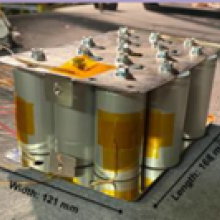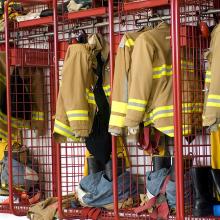Blog
NEW RESOURCE - Chlorine Emergency Kit Inspection & Storage Guidance
| Robyn Kinsley, Vice President of Transportation & Emergency Preparedness, The Chlorine Institute
The Chlorine Institute (CI) has many chlorine emergency response resources, including instruction booklets and videos for the Chlorine Institute Emergency Kits “A” (A-Kit), “B” (B-Kit), and “C” (C-Kit). CI and its members often receive questions regarding the replacement recommendations for the kit gaskets. Through these inquiries, we have discovered that some parties keep their Viton® gaskets much longer than the four-year shelf-life recommendation or the gaskets are not stored in a condition that allows them to last as long as four years.

Responding to a Hazmat Event with Minimal Resources:
| Gareth Black, Senior Crisis Consultant, CHEMTREC
Anderson County, Kansas has a population of just under 8000 residents. It’s emergency services, like many across the country are largely staffed by volunteers and lack the resources of larger metropolitan departments. Despite this, the county still must contend with many high hazard industries and high hazard vehicles on its roads and railroads. This reduced capacity, combined with the potential impact of an incident was recently put to the test when CHEMTREC’s Crisis Solutions team ran a live exercise scenario in Garnett, Anderson County.

Responding to Roadside Spray Rig Incidents
| Toby Crow, Corteva Agriscience Emergency Response and Security
We have all noticed these vehicles traversing the roadsides of the places that we live and work. They are usually referred to as roadside spray trucks or roadside spray rigs. These trucks typically operate safely, and without incident. But as with any vehicle, accidents can occur. As a first responder, these incidents can add complexities outside of the usual transportation incident based on what the truck is carrying or what is in the truck’s onboard tanks.

Lithium-ion Batteries: Risks and Rewards
| George Kercher, Executive Director, PRBA
When Sony first introduced lithium-ion batteries into the marketplace in 1991, little did they know how transformative this new rechargeable battery technology would become 30 years down the road and how quickly it would displace older, more established rechargeable battery technologies in the market.

RFA Ethanol Safety Training Program Now Available in Spanish
| Missy Ruff, Director of Safety & Technical Programs, Renewable Fuels Association
The Renewable Fuels Association is excited to add another tool to their toolbox. The Ethanol Emergency Response Safety training program is now able to reach new audiences, with the completion of Spanish-language versions of all materials, thanks to the Pipeline and Hazardous Materials Safety Administration’s (PHMSA) ALERT grant program.
Find Training Events Near You
- United States
- Alabama
- Alaska
- Arizona
- Arkansas
- California
- Colorado
- Connecticut
- Delaware
- Florida
- Georgia
- Hawaii
- Idaho
- Illinois
- Indiana
- Iowa
- Kansas
- Kentucky
- Louisiana
- Maine
- Maryland
- Massachusetts
- Michigan
- Minnesota
- Mississippi
- Missouri
- Montana
- Nebraska
- Nevada
- New Hampshire
- New Jersey
- New Mexico
- New York
- North Carolina
- North Dakota
- Ohio
- Oklahoma
- Oregon
- Pennsylvania
- Rhode Island
- South Carolina
- South Dakota
- Tennessee
- Texas
- Utah
- Vermont
- Virginia
- Washington
- Washington, D.C.
- West Virginia
- Wisconsin
- Wyoming
- Canada
- Mexico